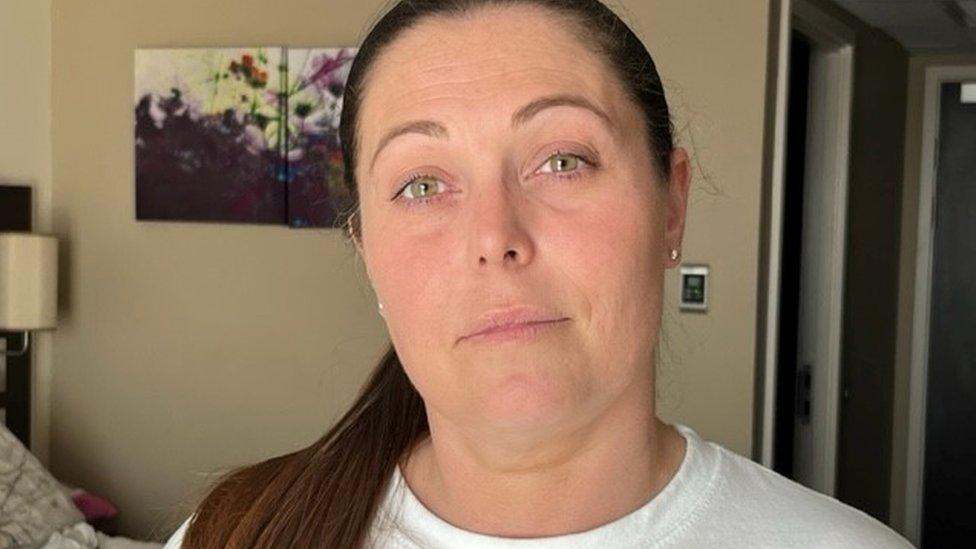Clearsprings: Home Office asylum contractor prices out homeless
- Published

Sara-Jo Croker has been living in hotels, with her children, for five months
The Home Office has been accused of leaving people homeless by outbidding councils in a fierce competition for scarce accommodation.
Several local authorities have lost out to a Home Office contractor finding properties to house asylum seekers.
The number of people in England having to stay in temporary accommodation is near record levels.
Asked on three separate occasions why its contractor paid more than councils can, the Home Office refused to say.
The problem is most acute in London, where councils estimate about 166,000 people live in temporary accommodation - more than the total population of Oxford.
There was no suggestion the Home Office or asylum seekers created the problem, said Labour's Georgia Gould, who chairs London Councils, which represents all local authorities in the city. But she said "the Home Office is contributing to homelessness".
The councils, spending £52m a month on temporary accommodation, had agreed "that we will not outbid each other, because we want to protect taxpayers' money", Ms Gould said.
"We would like the same partnership with the Home Office," she added.
The competition for properties is due to:
a failing housing market that has, for decades, built too few properties
a broken asylum system, with record numbers of people awaiting an initial decision on their cases
The Home Office is under pressure to cut the approximately £7m a day it is paying to house asylum seekers in hotels.
And its contractor, Clearsprings, is trying to find accommodation for them. There is no suggestion Clearsprings is doing anything illegal.
Kieron Williams, leader of Southwark council, in south London, said its homelessness staff "have never seen anything like this - we have all but run out of options" to find temporary accommodation in the borough.
"This is being made worse by the Home Office procuring properties in our borough which we desperately need," he said.
Enfield, Westminster and Luton councils have also raised concerns about the impact of the Home Office contractor.
According to London Councils:
The number of private-sector lettings in the city has fallen by nearly 40% in the past five years
7% of all temporary accommodation used by councils has been taken back by providers in the past six months alone

Capital Letters chief executive Sue Coulson says: "There's just not enough accommodation"
On Tuesday, Capital Letters, a property agency owned by 10 London boroughs, could find only 18 homes within the limits of what the government will pay in housing benefit, in the entire city.
The rates, known as the local housing allowance, vary by location and property size and have been frozen for three years, despite soaring rents.
Councils across England are calling for an emergency increase because of the lack of affordable accommodation.
Meanwhile, thousands of families are having to spend weeks in hotels.
Enfield council, in north London, is spending £850,000 a month housing residents in hotels.
Dozens of families are living in a local Travelodge and last month some had to be temporarily moved out of London altogether, as other guests had booked to stay there during Beyoncé's concerts.
'Been horrendous'
In east London, nursery worker Sara-Jo Croker, 38, and her two children have been living in hotels for five months, after being evicted from their home when their landlord decided to sell it.
"It's been horrendous," she said. "My whole life is in this room."
Her current abode, a Premier Inn, is "good" but she has been moved to three other hotels, one of which was "filthy".
"I wouldn't even put a dog in it," Ms Croker said.
She has no cooking facilities, must make a 90-minute round trip to take her daughter to school each day and has to pay a £7 daily charge to park at the hotel.
Incentive payments
Ms Croker said she was spending about £1,500 a month on fuel, parking and eating out each night and had had to give up all the furniture she had been keeping in storage as she could not afford the £250 monthly fee.
"I can't afford to pay for that," she said. "I don't know how long I'm going to be in here."
Clearsprings is not just willing to pay higher rents. It also pays higher incentive payments to encourage landlords to cooperate.
"We understand they are giving about £2,000 per property more than we can offer," Capital Letters chief executive Sue Coulson said.
"That's a lot of money to a landlord, almost a month's rent."
The Home Office did not explain why its contractor is allowed to pay more than councils, who have a statutory duty to provide those families they accept are homeless with accommodation.
However, in a statement it said: "We have a statutory duty to ensure asylum seekers have access to safe and secure accommodation.
"If there is a need for Clearsprings to go above the local housing allowance, for example to ensure we are complying with this duty, then we will let the local council know."
- Published16 June 2023

- Published25 May 2023

- Published14 June 2023
